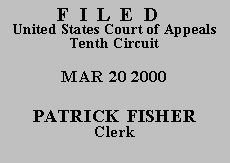

| COY RAY YOCHAM,
v.
GARY L. GIBSON; ATTORNEY
GENERAL OF THE STATE OF
OKLAHOMA |
No. 99-7140
(D.C. No. 99-CV-190-B) |
AEDPA, effective April 24, 1996, provides that "[a] 1-year period of limitation shall apply to an application for a writ of habeas corpus by a person in custody pursuant to the judgment of a State court," running from "the date on which the judgment became final." 28 U.S.C. § 2244(d)(1)(A). Prisoners for whom the statute of limitations would have expired before the effective date of AEDPA, however, are granted an equitable grace period tolling the statute of limitations until April 23, 1997. See United States v. Simmonds, 111 F.3d 737, 746 (10th Cir. 1997). Section 2244(d)(2) also provides for tolling of the time limit while "a properly filed application for State post-conviction or other collateral review" is pending in State court.
Yocham's petition is facially untimely under the terms of the AEDPA limitation period. For purposes of the limitation period, Yocham's conviction became final on July 18, 1994, when the ninety-day period for him to seek a writ of certiorari from the United States Supreme Court expired. See Caspari v. Bohlen, 510 U.S. 383, 390-91 (1994). Therefore, he had one year from April 24, 1996, to seek habeas relief. See Hoggro v. Boone, 150 F.3d 1223, 1226 (10th Cir. 1998). On March 3, 1997--fifty-one days before the expiration of the limitation period--Yocham filed an application for post-conviction relief in the Atoka County District Court, thereby tolling the limitation period. See 28 U.S.C. § 2244(d)(2). The Oklahoma Court of Criminal Appeals affirmed the denial of this petition on April 20, 1998. See Yocham v. State, No. PC97-1745 (Okla. Crim. App. Apr. 20, 1998). This left Yocham with fifty-one days to file for federal habeas relief. However, he did not file the instant petition until April 22, 1999, over a year after the expiration of the tolling period triggered by the pendency of his state post-conviction application. Therefore, the instant petition is facially untimely.
Yocham argues for the application of equitable tolling. We have held that "[t]here may be circumstances where the limitation period at least raises serious constitutional questions and possibly renders the habeas remedy inadequate and ineffective." Miller v. Marr, 141 F.3d 976, 978 (10th Cir. 1998) (citation omitted). To avoid such constitutional questions, we may subject the AEDPA limitation period, which is procedural and not jurisdictional, to equitable tolling in appropriate circumstances. See id. One such circumstance is when the petitioner asserts "that a constitutional violation has resulted in the conviction of one who is actually innocent or incompetent." Id. (citing Schlup v. Delo, 513 U.S. 298, 324-29 (1995); Cooper v. Oklahoma, 517 U.S. 348, 352-56 (1996)). Therefore, the question of whether equitable tolling should apply to a facially untimely habeas petition may raise substantial constitutional questions compelling the grant of a certificate of appealability. Such, however, is not the case here.
First, Yocham argues that equitable tolling is justified by the Oklahoma Indigent Defense System's failure to file post-conviction proceedings on his behalf pursuant to an alleged agreement to do so. Even had such an agreement existed and been breached--an allegation not established by the document offered by Yocham--the undisputed fact remains that Yocham himself filed for post-conviction relief within the AEDPA limitation period and had fifty-one days from the final denial of that application for relief in which to seek federal court redress. The Oklahoma Indigent Defense System's alleged failure to file simply has no bearing on Yocham's own failure to pursue habeas relief for over a year following the conclusion of his post-conviction proceedings.
As a second ground for equitable tolling, Yocham maintains actual innocence. Indeed, it appears from his pleadings that Yocham asserts not only factual innocence of his state conviction, but also insanity and incompetence to stand trial. However, his conclusory allegations of innocence and insanity are unaccompanied by either specific factual support or any evidence establishing a constitutional violation accompanying his conviction. Cf. Miller, 141 F.3d at 978. Therefore, we find no grounds indicating that the exercise of our power of equitable tolling might be justified to prevent a constitutional violation.
Because we conclude that Yocham has not made "a substantial showing of the denial of a constitutional right," 28 U.S.C. § 2253(c)(2), we deny a certificate of appealability and dismiss this appeal.
The mandate shall issue forthwith.
ENTERED FOR THE COURT
Carlos F. Lucero
Circuit Judge
*. The case is unanimously ordered submitted without oral argument pursuant to Fed. R. App. P. 34(a)(2) and 10th Cir. R. 34.1(G). This order and judgment is not binding precedent, except under the doctrines of law of the case, res judicata, and collateral estoppel. The court generally disfavors the citation of orders and judgments; nevertheless, an order and judgment may be cited under the terms and conditions of 10th Cir. R. 36.3.